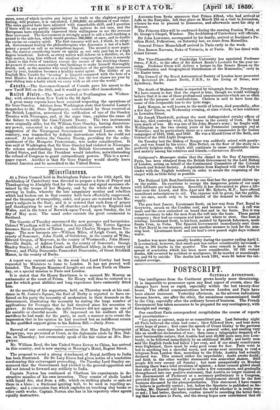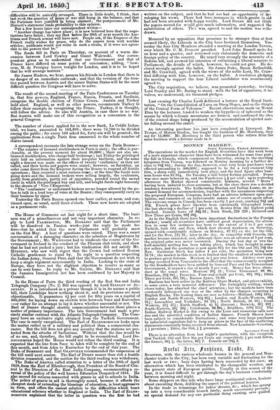POSTSCRIPT.
SATURDAY AFTERNOON.
Our intelligence from the Continent grows hourly more threatening. It is impossible to pronounce upon any final aspect of events, since the changes have been so rapid, especially within the last twenty-four hours. The official communications between London and Paris have been almost incessant. Yesterday afternoon, as the adverse indications became known, one after the other, the uneasiness communicated itself to the City, especially after the ordinary hours of business. The French Government has taken measures to be prepared for any contingency, with foresight and energy.
Our excellent Paris correspondent recapitulates the course of reports and uncertainties— "Lea jours se solvent, mais ne se resaemblent pas. Last Saturday night all Paris believed the crisis had come ; blow followed blow, and beat down every hope of peace ; first came the speech of Count Giulay to the garrison of Milan, for some time believed to be a general order, and reading very like an unofficial declaration of war ; then came a telegraphic dematch of a most businesslike nature, that Austria had sent 50,000 more men into Lom- bardy, to be followed immediately by an additional 60,000; and lastly men said the English funds had fallen 1 per cent, and if our steady countrymen were frightened, there must be some good cause for fear. Paris went to bed in anything but a cheerful mood, and awoke next morning to read a ' telegram from London that, according to the Globe, Austria had actually declared war. This seemed rather too improbable ; doubt awoke doubt ; - and faith in the other warlike statements was somewhat shaken. Still people felt very uneasy all Sunday ; but most unexpectedly on Monday morning there was a total revulsion of opinion ; a faint rumour glided about that after all Austria was disposed to make a few concessions, and gradually strengthened into one positive statement, that Austria no longer insisted on the disarmament of Piedmont as a necessary preliminary to a Congress, provided that the question of a general disarmament should be the first business discussed by the plenipotentiaries. This statement I have reason- to believe is perfectly correct ; but, before the Spectator is published on Sa- turday, Mr. Disraeli will have informed the world whether it is really true or not ; I had better, therefore, confine myself to recording the better feel- ing that has arisen in Paris, and the strong hopes now entertained that all
difficulties will be amicably arranged. There is little doubt, I think, that last week the question of peace or war still hung in the balance, and that the Parisians were justified in being alarmed ; the postponement of Mr. Disraeli's statement lends probability to this opinion. But a few hours later our correspondent writes- " Another change has taken place it is now believed here that the nego-
tiations have failed ; they say that place, the 20th of next month the Aus- trians and French armies will have met. People ask, if the Emperor of the French really wishes for peace, why do the papers teem with warlike articles ; publicists would not write in such a strain, if it were not agree- able to the powers that be."
The funds fell in Paris on Thursday, on account of a warm dis- cussion between Lord Cowley and Count Walewski. Our corres- pondent gives us to understand that our Government and that of France have differed on some points of concession; adding, "how- ever, M. de Persigny leaves tonight for London, and it is to be hoped that he will arrange matters."
Sir James Hudson, we hear, assures his friends in London that there is no danger of an immediate outbreak ; and that the revision of the trea- ties passed between Austria and the minor Italian States will be the most difficult question the Congress will have to solve.



























 Previous page
Previous page